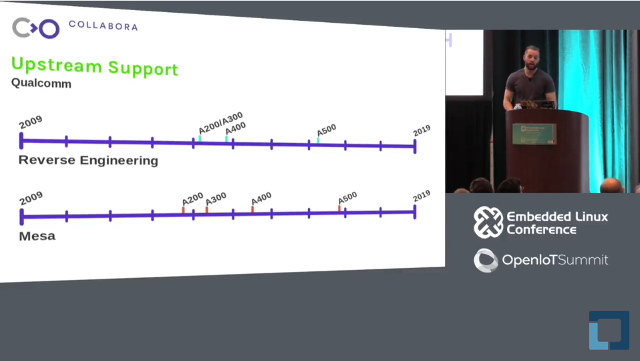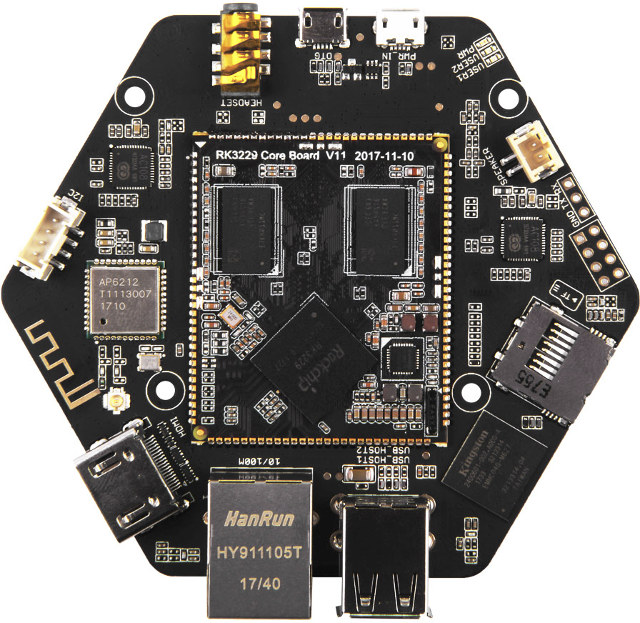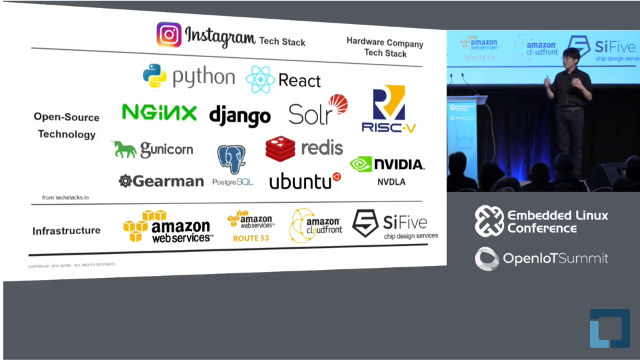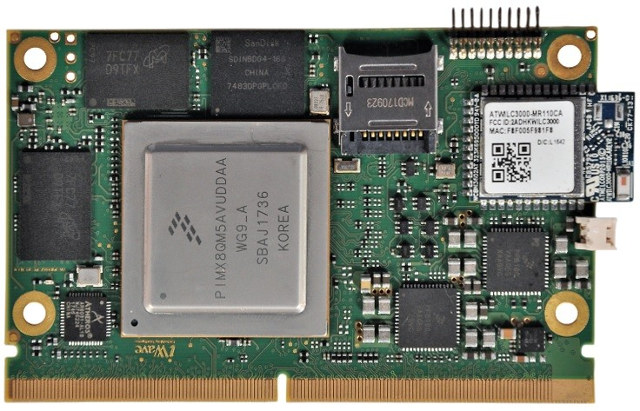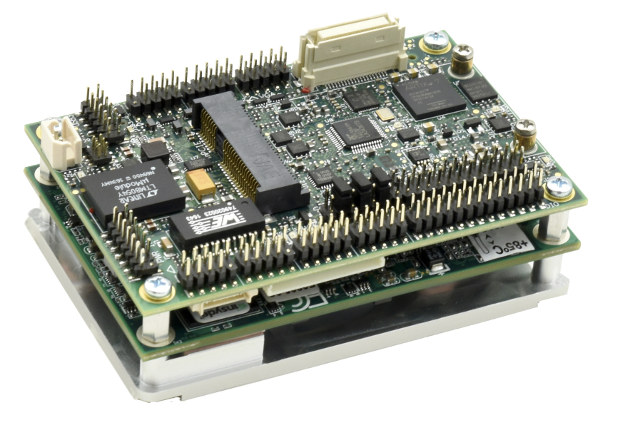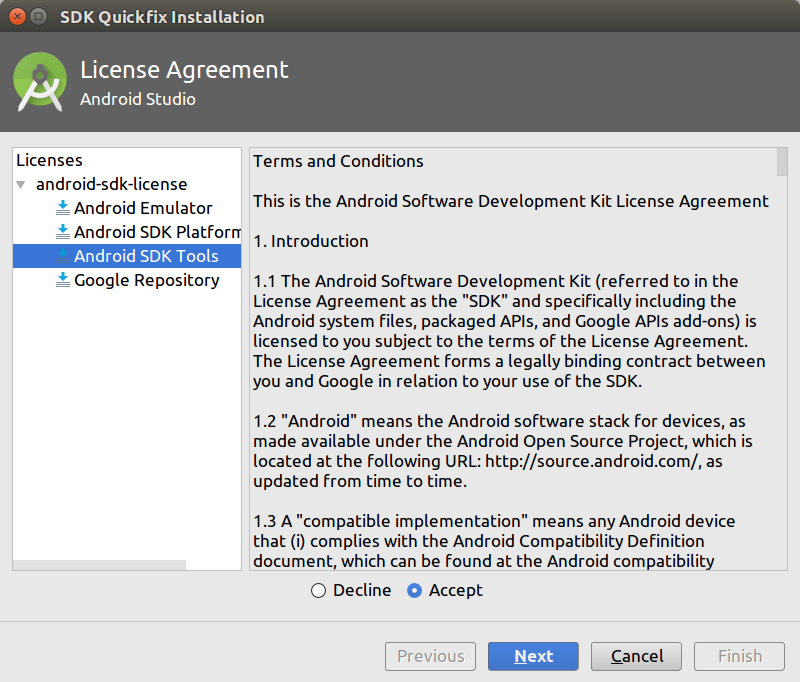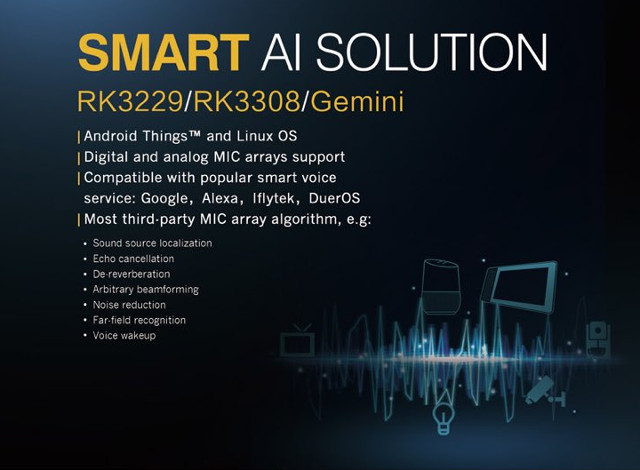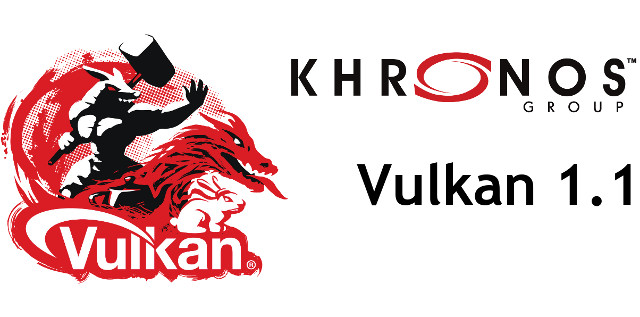The Embedded Linux Confernce is on-going, and the Linux Foundation has been uploading videos about talks in a timely manner on YouTube. I checked out at RISC-V keynote yesterday, but today I’ve watched a talk by Robert Foss (his real name, not related to FOSS) from Collabora entitled “Progress in the Embedded GPU Ecosystem”, where he discusses open source software support in Linux/Mesa from companies and reverse-engineering support. The first part deals with the history of embedded GPU support, especially when it comes to company support. Intel was the first and offers very good support for their drivers, following by AMD who also is a good citizen. NVIDIA has the Nouveau driver but they did not really backed it up, and Tegra support is apparently sponsored by an aircraft supplier. Other companies have been slower to help, but Qualcomm has made progress since 2015 and now support all their hardware, […]
ReSpeaker Core v2 is a 6-Mic Array Audio Development Kit Powered by Rockchip RK3229 Processor
Seeed Studio launched ReSpeaker Core board designed for voice interaction in 2016. The board was based on a Mediatek MT7688 MIPS WiSoC running OpenWrt, and came with a single built-in microphone, although a microphone array board with 7 microphones and 12 LEDs was also offered as option. The company is now back with a more powerful update of the board – called ReSpeaker Core v2 – featuring Rockchip RK3229 quad core Cortex A7 processor, running Debian Linux, and with 6 on-board microphones. Beside WiFi connectivity, the board also adds Ethernet and Bluetooth 4.0, as well as a USB hot port compared to the previous version. ReSpeaker Core v2 specifications: SoC – Rockchip RK3229 quad core Cortex A7 processor @ up to 1.5 GHz with Arm Mali-400MP2 GPU System Memory – 1GB DDR3 RAM Storage – 4GB eMMC flash, micro SD card slot Video Output – HDMI 2.0 (but drivers not […]
RISC-V Keynote at Embedded Linux Conference 2018 (Video)
The Embedded Linux Conference and OpenIoT Summit 2018 have just started, and the Linux Foundation has already uploaded a few keynote videos to YouTube, including the one by Yunsup Lee, Co-Founder and CTO, SiFive, entitled “Designing the Next Billion Chips: How RISC-V is Revolutionizing Hardware”. Yunsup explains the current problem with chip development, and go through the open source RISC-V solutions offered by Sifive. Currently design a chip has a high upfront (NRE = non-recurring engineering) costs, is time-consuming (1.5 to 2 years at least) and silicon vendors normally target high volume production, but now many applications like IoT or machine learning require custom chips that may not be (yet) manufactured in such high volume. The solution is to adapt some idea from open source software to open source hardware in order to lower the costs, enable fast prototyping, and involve the community of designers and software developers. He took […]
iWave Systems iW-RainboW-G27M SMARC 2.0 SoM Features NXP i.MX8 QuadMax Processor
We’ve previously seen SECO will soon launch SM-C12 SMARC 2.0 SoM powered by NXP i.MX 8M processor, but there’s not the only company working on a SMARC 2.0 compliant system-on-module powered by the latest NXP 64-bit Arm processor, as iWave Systems iW-RainboW-G27M module should be coming up soon with a more powerful NXP i.MX 8QuadMax Arm Cortex A72/A53/M4 processor coupled with 4GB LPDDR4 RAM by default. The i.MX8QuadMax SMARC System-on-Module targets “complex embedded application of consumer, medical and industrial embedded computing applications”. iWave Systems iW-RainboW-G27M specifications: SoC – NXP i.MX8 QuadMax processor with 2x Cortex-A72 @ 1.8 GHz, 4x Cortex-A53 @ 1.2 GHz,2 x Cortex-M4F @ 266 MHz, 2x Vivante GC7000XSVX GPUs, and a 4K H.265 decode & 1080p h.264 enc/dec capable VPU System Memory – 4GB LPDDR4 (Expandable) On-module Storage – 16GB eMMC Flash (Expandable), micro SD slot, optional 256MB QSPI Flash On-module Connectivity – 2x Gigabit Ethernet PHY, […]
Diamond Systems Zeta is a Miniature SBC Based on Bay Trail/Apollo Lake COM Express Mini Modules
Diamond Systems, a Silicon valley based company providing embedded computing solutions for transportation, energy, aerospace, defense, manufacturing, medical and research market, has recently introduced Zeta single board computer comprised of a baseboard, a choice of COM Express Mini type 10 modules based on Intel Bay Trail or Apollo Lake processor, and a heatspreader for cooling. The company explains the small size and high feature density of the solution make it particularly suitable for mobile applications. The SBC also supports a wide range 6-36VDC input voltage, and works in -40 to +85°C temperature range. Zeta SBC specifications: COM’s Processor and System Memory Intel Atom Bay Trail E3825 dual core processor @ 1.33GHz with 2GB RAM Intel Atom Apollo Lake E3940 quad core processor @ 1.6GHz with 4GB RAM Intel Pentium Apollo Lake N4200 quad core processor @ 1.1GHz (burstable to 2.5GHz) with 8GB RAM Storage – 1x mSATA socket , 1x […]
Scrcpy Open Source Software Let You Control an Android Phone via a Windows, Mac OS, or Linux PC
Have you ever wished you could control or mirror your Android smartphone using your computer? Scrcpy, a free and open source program by Genymotion may fit your needs, and works on Windows, Mac OS or Linux. You just need to install (or build) a program on your host computer, connect your phone via USB, switch to developer mode, enable USB debugging, and run the program which will automatically install the server (a jar file) on your phone, which does not need to be rooted. The easiest way to try is with Windows since the developers already provide pre-built binaries, but I installed it on Ubuntu 16.04 instead since it is the operating system I use daily. Some of the packages in Ubuntu 16.04 are a bit old so it took me a couple of hours to successfully install it, and I’d recommend going with Ubuntu 17.10 or 18.04 daily build […]
Rockchip Unveils RK3308 & Gemini Cortex-A35 Processors for Smart Speakers
Rockchip has posted a tweet about smart speakers, specifically about Midea AI speaker based on Rockchip RK3229, but the second image is what caught my eyes, as it reveals two new Arm Cortex A35 processor designed for “Smart AI solutions”, namely RK3308 and “Gemini” Processor. Rockchip RK3308 “mainstream” processor specifications: CPU – Quad core Cortex A35 processor GPU – TBD (maybe none?) Audio Integrated 8-ch ADC and hardware VAD (Voice Activity Detection) module Multi-channel PDM/I2S/TDM audio interface Rockchip Gemini “high-end” processor specifications: CPU – Quad core Cortex A35 processor GPU – Mali Dvalin MP2 GPU Audio – “high-end smart audio solution”; multi-channel PDM/I2S/TDM audio interface Video I/O – LCD screen & camera support Rockchip will provide support for Android Thing and Linux for the processors, as well as integration with MIC arrays boards and popular voice services such as Amazon Alexa, Google Assistant, Baidu DuerOS, and others. Arm Cortex A35 […]
Vulkan 1.1 and SPIR-V 1.3 Specifications Released
The Khronos Group released Vulkan 1.0 specifications in 2015 as a successor of OpenGL ES, compatible with OpenGL ES 3.1 or greater capable GPU, and taking less CPU resources thank to – for instance – better use of multi-core processors with support for multiple command buffers that can be created in parallel. A year later, we saw Vulkan efficiency in a demo, since then most vendors have implemented a Vulkan driver for their compatible hardware across multiple operating systems, including Imagination Technologies which recently released Vulkan drivers for Linux. The Khronos Group has now released Vulkan 1.1 and the associated SPIR-V 1.3 language specifications. New functionalities in Vulkan 1.1: Protected Content – Restrict access or copying from resources used for rendering and display, secure playback and display of protected multimedia content Subgroup Operations – Efficient mechanisms that enable parallel shader invocations to communicate, wide variety of parallel computation models supported […]


